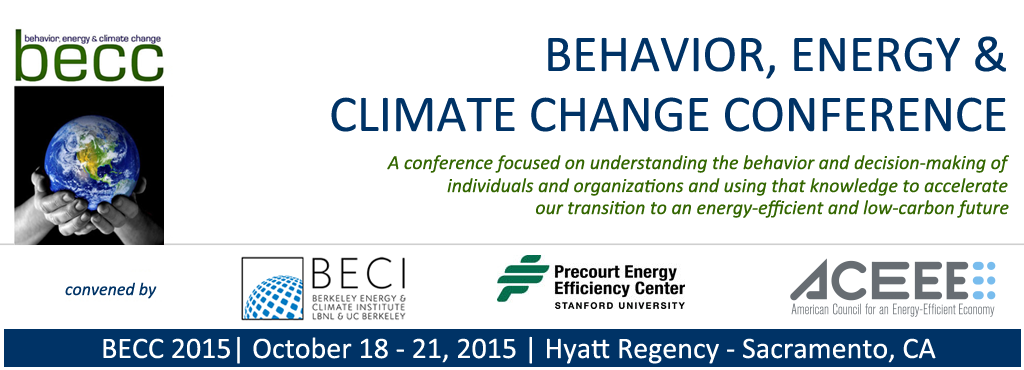BECC 2015│October 18 – 21
Hyatt Regency | Sacramento, California
Keynote Address Just Announced!
The Emerging Alliance of Religion and Ecology
 Dr. Mary Evelyn Tucker, Forum on Religion and Ecology at Yale University, will open our conference. http://fore.yale.edu
Dr. Mary Evelyn Tucker, Forum on Religion and Ecology at Yale University, will open our conference. http://fore.yale.edu
This keynote explores the role of religious, ethical, and spiritual practices in addressing national and international climate change. Given the Pope’s upcoming encyclical on the environment, this talk will be a timely topic.
The Forum on Religion and Ecology is the largest international multireligious project of its kind. With its conferences, publications, and website, it explores religious worldviews, texts, ethics, and practices to broaden understanding of current environmental concerns. The Forum recognizes that religions need to be in dialogue with other disciplines (e.g., science, economics, education, and public policy) in seeking comprehensive solutions to both global and local environmental problems.
Publish your paper in the BECC Conference Proceedings – If your abstract was accepted as a presentation, lightning or poster you are eligible to publish your paper in the BECC Conference Proceedings. Papers are hosted on eScholarship, an open access publishing repository hosted by the University of California that is cataloged by scholarly search engines. Send us your final paper at least one week prior to the conference for posting.
The Behavior, Energy and Climate Change Conference (BECC) is the premier international conference focused on understanding human behavior and decision making so that this knowledge can accelerate the transition to an energy-efficient and low-carbon future. BECC is currently in its ninth year and is associated with a growing set of allied conferences in Europe and Asia.
Broad Goals
- Identify key lessons about behavior and decision making that advance energy/climate solutions
- Help integrate research insights throughout the value chains of energy-using goods and services
- Expand support for social science research as applied to the biggest contributors to today’s energy challenges
- Facilitate knowledge accumulation, exchange, and collaboration across analytical approaches from micro to macro (e.g., individual, group, organizational, societal behavior and decision making)
Key Themes – Behavioral research insights can help…
- Find real energy savings that will benefit the economy, security, and environment
- Accelerate climate-friendly innovation via appealing, user-focused design, faster diffusion, and better management practices
- Increase the benefits and decrease the costs of energy-oriented policies and programs
- Improve the analytic models that guide our vision for the future
Attendees – BECC draws a broad mix of…
- Researchers (e.g., economics, psychology, sociology, anthropology, management, law, humanities, interdisciplinary)
- Decision makers (e.g., federal, state, and local agencies, legislators, regulators)
- Practitioners (e.g., utilities, consultants, manufacturers, designers, architects, entrepreneurs, marketers, purchasers)
- Influencers (e.g., community organizations, media, nonprofits, religion, entertainment)
Why attend BECC?
Every year we assemble great speakers and provide cutting-edge information: The BECC 2015 program will include more than 40 plenary and topic sessions showcasing over 150 presenters selected through a competitive abstract process or invited by the organizing committee, ensuring state-of-the-art information available in no other forum. There will also be poster presentations, workshops, and our traditional fun film festival. Past attendees from many different fields have described BECC as the “most interesting and thought-provoking conference” they have ever attended.
Who attends?
BECC brings together a range of academics, practitioners, and policymakers from a variety of fields engaged in energy and climate efforts in order to provide the latest and most relevant behavioral research, best practices, and methodologies. We value abstracts from any relevant discipline concerned with human behavior, society, and culture; particularly work from social and behavioral psychology, behavioral economics, applied anthropology, organizational behavior, political science, communications, and the cognitive sciences. If you work in this area, or are considering research in this area this is a must-attend event.
The conference size is limited to 700 participants and regularly sells out!

